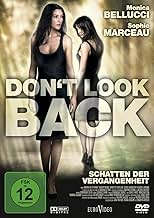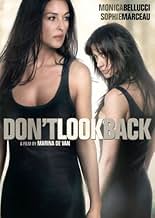IMDb RATING
5.8/10
7.6K
YOUR RATING
A psychodrama about a photographer whose pictures tell a different story to that of her perception.A psychodrama about a photographer whose pictures tell a different story to that of her perception.A psychodrama about a photographer whose pictures tell a different story to that of her perception.
- Awards
- 1 nomination
Thomas De Araujo
- Jérémie 8 ans
- (as Thomas de Araujo)
Storyline
Did you know
- TriviaThe scene at the beginning of the film was shot in Luxembourg. The well-known bar called Cat Club completely burned down in 2015.
- ConnectionsFeatured in On demande à voir: Episode dated 2 September 2009 (2009)
- SoundtracksPizzicarella
Traditional
Featured review
Selected for competition in Cannes this year and the closing film at Singapore's French Film Festival, Don't Look Back is a rather straight-forward psychological drama starring two European actresses who would need no introduction in Monica Bellucci and Sophie Marceau playing the same role of Jeanne, or so it seems.
We're introduced to Sophie's version first, where she's attempting to write a novel after a series of successful non-fiction works, for the sole reason of revisiting her much forgotten, and likely repressed past. Despite her publisher's persuasion to abandon the idea because it's only to dig up some skeletons best left hidden, she forges forward and bit by bit discovers that she's starting to lose her mind, where furniture starts to be in places she no longer remembers, and family members start to look physically different, which of course is enough for anyone to freak out. And the icing of the cake, she morphs from French looking Sophie Marceau, to the Italian babe Monica Bellucci. Which is not a bad thing of course, considering one can morph into somebody less attractive or endowed even.
In the meantime, we're left to wonder if Jeanne (in whichever version) is starting to lose it, whether it could be an extreme and early onset of the Alzheimer's, as roads become unrecognizable, husbands become someone else, and scars disappear and reappear. It's an extreme case of severe identity crisis where one is thankful that it doesn't take the cop-out route and make everyone wake up from a bad nightmare.
It's an extremely well made psychological piece which explores the fear that comes with losing the things that we hold dear, and also the uncomfortable sense of being outside an established comfort zone, journeying into the big unknown, deducing what actually is happening, despite not knowing where to start, and the developing suspicion that everyone is in on the joke, except for yourself.
It's tough to compare who was the better Jeanne, because Sophie disappears for the most part from the second act onwards. Screen time shared by both actresses in the same frame is extremely limited as well, so we'd only get to savour one sold performance after another, turn-based. There's a proper explanation to everything that's happening, though one has to be patient in order to allow the narrative to reveal itself in due course. So meanwhile, accept what's presented, and try to piece together the jigsaw yourself.
We're introduced to Sophie's version first, where she's attempting to write a novel after a series of successful non-fiction works, for the sole reason of revisiting her much forgotten, and likely repressed past. Despite her publisher's persuasion to abandon the idea because it's only to dig up some skeletons best left hidden, she forges forward and bit by bit discovers that she's starting to lose her mind, where furniture starts to be in places she no longer remembers, and family members start to look physically different, which of course is enough for anyone to freak out. And the icing of the cake, she morphs from French looking Sophie Marceau, to the Italian babe Monica Bellucci. Which is not a bad thing of course, considering one can morph into somebody less attractive or endowed even.
In the meantime, we're left to wonder if Jeanne (in whichever version) is starting to lose it, whether it could be an extreme and early onset of the Alzheimer's, as roads become unrecognizable, husbands become someone else, and scars disappear and reappear. It's an extreme case of severe identity crisis where one is thankful that it doesn't take the cop-out route and make everyone wake up from a bad nightmare.
It's an extremely well made psychological piece which explores the fear that comes with losing the things that we hold dear, and also the uncomfortable sense of being outside an established comfort zone, journeying into the big unknown, deducing what actually is happening, despite not knowing where to start, and the developing suspicion that everyone is in on the joke, except for yourself.
It's tough to compare who was the better Jeanne, because Sophie disappears for the most part from the second act onwards. Screen time shared by both actresses in the same frame is extremely limited as well, so we'd only get to savour one sold performance after another, turn-based. There's a proper explanation to everything that's happening, though one has to be patient in order to allow the narrative to reveal itself in due course. So meanwhile, accept what's presented, and try to piece together the jigsaw yourself.
- DICK STEEL
- Dec 11, 2009
- Permalink
- How long is Don't Look Back?Powered by Alexa
Details
Box office
- Budget
- €13,000,000 (estimated)
- Gross worldwide
- $2,651,917
- Runtime1 hour 51 minutes
- Color
- Sound mix
- Aspect ratio
- 2.35 : 1
Contribute to this page
Suggest an edit or add missing content



























